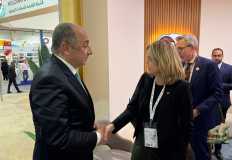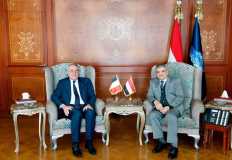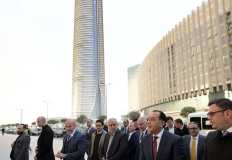Dr. Rania El-Mashat, Minister of International Cooperation, emphasized that Egypt's cooperation with development partners is guided by a clear national strategy and state-defined priorities. This approach, within the framework of "state ownership," ensures projects align with national goals. Egypt has already established strong partnerships with various multilateral, bilateral, and international development institutions.
This statement came during her
participation in a high-level panel discussion titled "Financing the
Future: Financial Instruments to Encourage Investment in Egypt" at the
Egyptian-European Investment Conference. Other participants included Mr. Jurgen
Rigterink, First Deputy President of the European Bank for Reconstruction and
Development; Mr. Gert Jan Koopman, Director General for Neighborhood
Negotiations and Enlargement at the European Commission; Ms. Gelsomina
Vigliotti, Vice President of the European Investment Bank; Engineer Khaled Abu
Bakr, Chairman of Arab Energy Company; and Mr. Amir Mashreki, Managing Director
of Prosperity Fund.
The Minister highlighted the
recently signed political declaration between Egypt and the European Union (signed
in March) as a significant step towards a stronger future partnership. Both
parties share a focus on numerous strategic sectors, including green hydrogen,
renewable energy, food security, water security, and digital transformation.
The European Union and its financing institutions are also key partners in
executing Egypt's national platform for green projects, "Nuwafy".
Structural reforms are critical
for fostering a welcoming investment climate, El-Mashat highlighted. This is
reflected in Egypt's partnerships with the European Union (through the MFA and
DPF programs) and international institutions like the World Bank and African
Development Bank. These collaborations emphasize clear structural reforms to
encourage private sector participation in development and drive these reforms
forward. The programs focus on three key areas: strengthening macroeconomic
stability, enhancing competitiveness and the business environment, and
promoting the green transition.
Highlighting the importance of
strong partnerships, El-Mashat emphasized how collaboration with development
partners has been instrumental. This cooperation has led to a unified approach
in tackling Egypt's development challenges. Together, they've developed
innovative solutions that drive progress, stimulate private sector investment,
and support crucial structural reforms.
Structural reforms implemented
since 2014, like the electricity feed-in tariff, have demonstrably attracted
significant investment to the renewable energy sector. These ongoing efforts,
further bolstered by the National Green Hydrogen Strategy (supported by the EU
and EBRD), are paving the way for a major expansion in green hydrogen
production.
The Minister of International
Cooperation also pointed to the diverse financing mechanisms offered by
development partners. These range from credit lines for small and medium-sized
enterprises (SMEs) and startups to concessional financing, investment
contributions, technical assistance, and investment guarantees.





